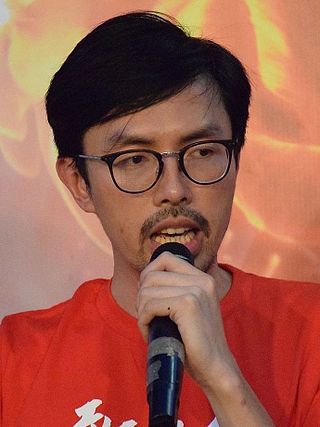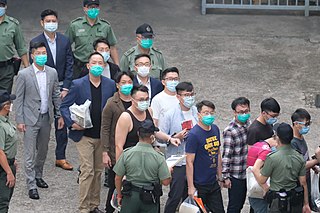
Leung Kwok-hung, also known by his nickname "Long Hair" (長毛), is a Hong Kong politician and social activist. He was a member of the Legislative Council, representing the New Territories East. A Trotskyist in his youth, he was a founding member of the Revolutionary Marxist League. He became a political icon with his long hair and Che Guevara T-shirt in the protests before he was elected to the Legislative Council in 2004. In 2006, he co-founded a social democratic party, the League of Social Democrats (LSD) of which he was the chairman from 2012 to 2016.

The Department of Justice (DoJ) is the department responsible for legal policy, the administration of justice, drafting legislation, and providing legal advice to the government in Hong Kong. It is headed by the Secretary for Justice, who reports to the Chief Executive directly. Paul Lam, a barrister, has served as Secretary for Justice since July 2022.

Claudia Mo Man-ching is a Hong Kong journalist and politician, a member of the pan-democracy camp. She represented the Kowloon West geographical constituency, until November 2020 when she resigned along other pro-democrats to protest against the disqualification of four of her colleagues by the government.

Joshua Wong Chi-fung is a Hong Kong pro-democracy activist and politician. He served as secretary-general of the pro-democracy party Demosistō until it disbanded following implementation of the Hong Kong national security law on 30 June 2020. Wong was previously convenor and founder of the Hong Kong student activist group Scholarism. Wong first rose to international prominence during the 2014 Hong Kong protests, and his pivotal role in the Umbrella Movement resulted in his inclusion in Time magazine's Most Influential Teens of 2014 and nomination for its 2014 Person of the Year; he was named one of the "world's greatest leaders" by Fortune magazine in 2015, and nominated for the Nobel Peace Prize in 2017.

Avery Ng Man-yuen is a Hong Kong politician and social activist. He is the chairman of the League of Social Democrats (LSD), a pro-democracy radical social democratic party in Hong Kong.

Eunice Yung Hoi-yan is a Hong Kong barrister and pro-Beijing politician. She is a former member of the New People's Party (NPP) and the Civil Force (CF). She became member of the Legislative Council of Hong Kong for New Territories East in 2016 and for Election Committee in 2021. She stepped down in December 2023 after her home was searched by the Hong Kong National Security Police.

The 2019–2020 Hong Kong protests were a series of demonstrations against the Hong Kong government's introduction of a bill to amend the Fugitive Offenders Ordinance in regard to extradition. It was the largest series of demonstrations in the history of Hong Kong.

"Glory to Hong Kong" is a protest anthem that was composed and written by a musician under the pseudonym "Thomas dgx yhl", with the contribution of a group of Hongkonger netizens from the online forum LIHKG during the 2019–2020 Hong Kong protests. It was initially written in Cantonese and was eventually developed into various language versions starting with English.

Jimmy Sham Tsz-kit is a Hong Kong pro-democracy and LGBT rights activist. He served as a convener for the pro-democracy organisation Civil Human Rights Front (CHRF) until October 2020 and serves as a secretary for the LGBT rights organisation Rainbow of Hong Kong. He is a longtime member of the League of Social Democrats. In 2019 he was elected to the Sha Tin District Council by residents of Lek Yuen constituency, but he resigned from this position in July 2021 amidst a government crackdown on pro-democracy councillors.
Events in the year 2020 in Hong Kong.
Kwok Wai-kin is a Hongkongese judge. He has sparked controversies over his political remarks on his hearings.

The Hong Kong 47 is a group of 47 pro-democracy advocates in Hong Kong charged with conspiracy to commit subversion under the Hong Kong national security law.

A dramatic manifestation of the far reach of the Hong Kong national security law was the mass arrest of 54 pro-democracy activists on 6 January. The arrested stood accused of subverting state power, a crime under the national security law, for their participation as candidates or in other capacities, in the 2020 Hong Kong pro-democracy primaries, which was part of a plan to increase pressure in parliament for democratic reform. Most of them were released on bail the following day. For the first time, the National Security Department of the police cited the national security law to block the website of HKChronicles. There were also several convictions in relation to the 2019-2020 Hong Kong protests.

On 22 February 2021, Xia Baolong, director of the Hong Kong and Macau Affairs Office, proposed that Hong Kong's governance had to be in the hands of "patriots". Observers considered it possible that the definition of "patriot" would require candidates for public office to embrace the rule of the Chinese Communist Party, as also suggested by Hong Kong Secretary for Constitutional and Mainland Affairs Erick Tsang; and that this signified a departure from the position that had prevailed since a speech by China's paramount leader Deng Xiaoping in 1984.

The city held its first National Security Education Day after the national security law had come into force. Chief Executive Carrie Lam emphasized that the law had helped Hong Kong to emerge from the "dark violence" of the 2019–2020 Hong Kong protests. National Security Committee Adviser Luo Huining also gave a speech. Even very young children were photographed handling toy weapons, which drew criticism.

On 14 May, authorities froze the assets of pro-democracy media tycoon Jimmy Lai. This was the first time that the pertaining provision in Article 43 of the national security law was applied. While Chief Executive Carrie Lam said on 18 May that the move would serve to bolster the status of Hong Kong as an international financial hub, several senior bankers and corporate lawyers not associated with Lai's accounts opined that the action – which was followed at the end of the month by a warning from the Security Secretary to banks against dealing with the frozen assets – was exposing risks for clients and top financial managers in Hong Kong.

Few protests took place in June 2021 and there were no large-scale demonstrations in threat of the national security law. The anniversary of the 1989 Tiananmen Square protests and massacre on 4 June saw only small crowds or single individuals engaging in vigils in the vicinity of Victoria Park – the venue of large vigils on the same occasion in past years – before police dispersed them. The pro-democracy tabloid Apple Daily once again had its headquarters raided by police using the national security law; its executives were arrested. Security Bureau also froze the assets of three Apple Daily companies, which led the newspaper to print its final edition on 24 June. Many pan-democratic groups disbanded at the end of the month under pressure from the law.

After the 1 July police stabbing, Hong Kong police and the government characterized the incident as a "lone wolf" terrorist attack. Foreign media saw the stabbing as a sign of a steep decline of the reputation of the police in the eyes of some locals, a process that had begun with the 2019–2020 Hong Kong protests. They also considered the uncovering of a bomb plot on 5 July as evidence of a polarization in society, and pointed to the influence of diminishing legal ways to voice dissent in the year since the national security law came into effect. At the beginning of the month, the police arrested citizens who posted on the Internet for inciting others to kill the police. Later it persecuted members of the student union of Hong Kong University for having passed a motion, subsequently withdrawn, that had praised the "sacrifice" of the deceased attacker of 1 July.
Events in the year 2023 in Hong Kong.



















